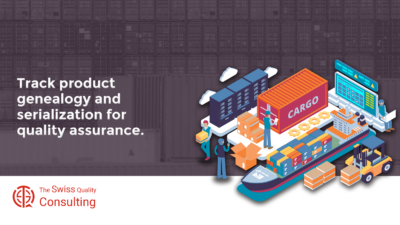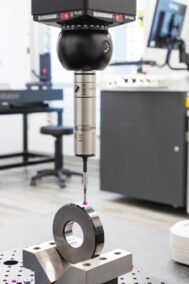Implementing Robust Tracking Systems for Superior Product Quality
Introduction
In the intricate world of manufacturing, tracking product genealogy and serialization for quality assurance has become an indispensable practice for businesses striving to maintain high standards. Aimed at business executives, mid-level managers, and entrepreneurs, this article delves into how effective tracking of product lineage and serialization significantly contributes to quality assurance and overall business success.
The Critical Role of Product Genealogy in Manufacturing
In today’s quality-driven and consumer-centric manufacturing landscape, product genealogy has emerged as an indispensable tool, empowering manufacturers to trace the complete lifecycle of their products from raw material acquisition to final delivery. Unlike traditional product tracking methods that focus on isolated stages of the manufacturing process, product genealogy provides a holistic view of a product’s journey, ensuring comprehensive quality control, enhanced traceability, and streamlined issue resolution.
At the heart of product genealogy lies the concept of comprehensive data capture and management. By meticulously documenting and storing every step of the manufacturing process, from material sourcing and component assembly to final testing and packaging, manufacturers gain a detailed understanding of the product’s origins, composition, and production history. This comprehensive data repository serves as a powerful tool for identifying potential quality issues, tracing the source of defects, and implementing corrective actions to prevent future occurrences.
The benefits of embracing product genealogy extend far beyond mere quality control. It empowers manufacturers to:
Enhance customer confidence and brand reputation: By providing transparent information about the origins, composition, and production processes of their products, manufacturers foster customer trust, enhance brand credibility, and protect their reputation in the marketplace.
Streamline supply chain management and risk mitigation: Product genealogy provides manufacturers with real-time insights into the movement of materials, components, and finished goods across the supply chain. This visibility enables manufacturers to identify potential disruptions, manage inventory effectively, and mitigate supply chain risks that could impact product quality and delivery.
Facilitate product recalls and issue resolution: In the event of a product recall or quality issue, product genealogy provides a comprehensive roadmap for identifying affected products, tracing the source of the problem, and implementing corrective measures swiftly. This proactive approach minimizes the impact of recalls, protects consumer safety, and maintains brand reputation.
Support regulatory compliance and audit trails: Product genealogy provides manufacturers with detailed documentation and audit trails that demonstrate compliance with industry regulations, safety standards, and quality assurance protocols. This transparency supports regulatory audits and protects businesses from potential legal liabilities.
Drive continuous improvement and innovation: By analyzing product genealogy data, manufacturers can identify patterns, trends, and areas for improvement within their production processes. This data-driven approach fosters continuous improvement initiatives, enhances product quality, and drives innovation in manufacturing methodologies.
In essence, product genealogy is not merely a quality assurance tool; it is a strategic enabler for manufacturers seeking to achieve operational excellence, enhance customer trust, and navigate the complexities of modern supply chains. By embracing product genealogy, manufacturers can gain a competitive edge, protect their brand reputation, and position themselves for sustainable growth and success in today’s quality-conscious and interconnected world.
Enhancing Product Traceability and Accountability
By implementing a system for tracking product genealogy, businesses can ensure greater traceability, accountability, and adherence to quality standards, ultimately leading to increased consumer trust and brand loyalty.
Serialization as a Tool for Quality Assurance
Serialization, the process of assigning a unique identifier to each product, plays a key role in tracking and quality assurance. It allows for easy identification, recall management, and verification of authenticity, safeguarding against counterfeits and ensuring compliance with regulatory standards.
Streamlining Recall Processes and Regulatory Compliance
With serialization, businesses can swiftly manage recalls if needed and comply with various industry regulations, thereby mitigating risks and protecting consumer safety.
Role in Change Management
Integrating product genealogy and serialization into manufacturing processes represents a significant aspect of change management. It requires businesses to adopt new technologies and adapt their operational models to enhance quality assurance mechanisms.
Embracing Technological Advancements in Manufacturing
Adopting these tracking systems requires a strategic approach, ensuring that all stakeholders understand their importance and are trained in the new processes and technologies involved.
Impact on Executive Coaching and Leadership
Leadership is critical in the successful implementation of product genealogy and serialization systems. Executive coaching services now include training on how to effectively manage and lead these technological integrations in manufacturing processes.
Leading with Innovation and Quality Focus
Through executive coaching, leaders learn to champion the adoption of these systems, understanding their impact on product quality and overall business success.
Effective Communication in Implementing Tracking Systems
Clear and effective communication is essential for the successful implementation of product tracking systems. It involves educating and aligning all stakeholders on the benefits and procedures of these systems.
Building a Culture of Quality and Precision
Promoting open communication about the adoption of tracking systems fosters a culture focused on quality and precision, encouraging a commitment to excellence across the organization.
Conclusion Tracking Product Genealogy and Serialization for Quality Assurance
In conclusion, tracking product genealogy and serialization for quality assurance is a strategic necessity for businesses in the manufacturing sector aiming to uphold high-quality standards. By embracing these tracking technologies, companies can ensure product integrity, enhance consumer trust, and strengthen their market position.
#ProductGenealogy, #Serialization, #QualityAssurance, #ManufacturingExcellence, #ProductTracking



















